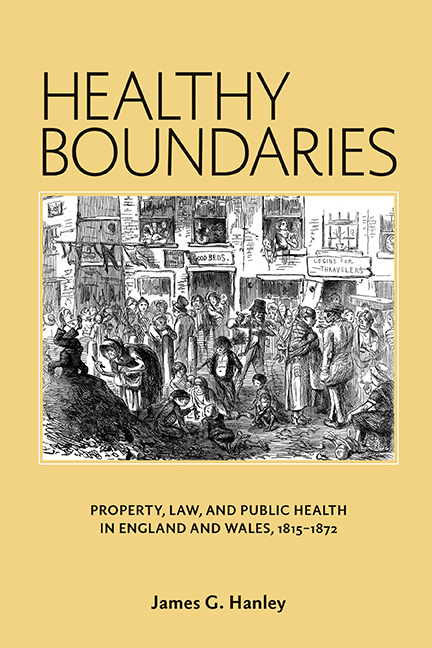Book contents
- Frontmatter
- Dedication
- Contents
- Acknowledgments
- Abbreviations
- Introduction
- 1 The Laws of Nuisance Before 1846: Property, Health, and Democracy in the Age of Reform
- 2 Private Benefit and Public Service: Paying for Sewers Before 1848
- 3 The Boundaries of Health, 1848–70
- 4 The Benefits of Health: London, 1848–65
- 5 Healthy Domesticity, 1848–72
- Conclusion
- Notes
- Bibliography
- Index
2 - Private Benefit and Public Service: Paying for Sewers Before 1848
Published online by Cambridge University Press: 07 May 2022
- Frontmatter
- Dedication
- Contents
- Acknowledgments
- Abbreviations
- Introduction
- 1 The Laws of Nuisance Before 1846: Property, Health, and Democracy in the Age of Reform
- 2 Private Benefit and Public Service: Paying for Sewers Before 1848
- 3 The Boundaries of Health, 1848–70
- 4 The Benefits of Health: London, 1848–65
- 5 Healthy Domesticity, 1848–72
- Conclusion
- Notes
- Bibliography
- Index
Summary
In the first half of the nineteenth century, utilities such as bridges, water supplies, and gas undertakings could all be privately owned; by mid-century about 90 percent of gas undertakings were privately owned, and only 10 out of 190 municipal corporations possessed their own water supply. Over the second half of the century, these services, at different times and to different degrees, were municipalized. Though it was by no means first in the field, the Birmingham council's takeover of its gas and water supplies in the 1870s caught the attention of contemporaries and historians, particularly once it became part of the narrative of the municipal gospel associated with Joseph Chamberlain's mayoralty. However, one utility that is usually absent from analyses of municipalization is the lowly sewer. In part, this absence makes sense. As far back as the sixteenth century, sewers were controlled by public bodies such as sewers commissions. By the end of the eighteenth century, there were approximately one hundred provincial sewers commissions across the country. Because of their public status, these commissions did not have to be municipalized, even though their constitutions and powers changed over time.
Yet the failure of sewers to find a place in the discussion of municipalization has, I suggest, led to a neglect of important problems and questions related to the provision and even the nature of this particular public good. The public provision of sewers is sometimes taken for granted in the literature on municipal provision. Private provision was, however, a real albeit infrequently chosen option for nineteenth-century towns. An analysis of why some towns first chose and then rejected it may tell us something about the nature of municipal provision.
Public sewer commissions also changed significantly over time. One of the most important of these changes involved rating. According to the Tudor Law of Sewers, parties could be forced to pay for sewers only if their property benefited from or avoided damage as a result of them. This law was still in force at the start of the nineteenth century, and sewer commissioners spent much time and energy attempting to avoid its consequences. A related but distinct change involved drainage areas.
- Type
- Chapter
- Information
- Healthy BoundariesProperty, Law, and Public Health in England and Wales, 1815–1872, pp. 39 - 64Publisher: Boydell & BrewerPrint publication year: 2016

